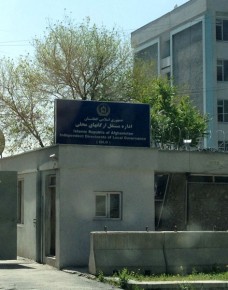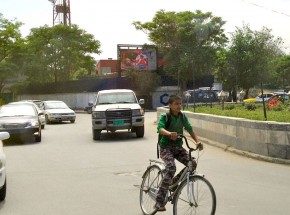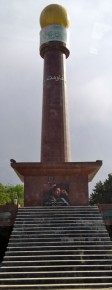
I've spent a month in Kabul already, which has passed in a flash! In this time, I have got to grips with my job, which is to help strengthen government systems - especially how the government in Kabul works with local structures at the provincial, municipal and district level.
DFID Afghanistan supports several projects in this area, including providing advice to the organisation at the heart of local governance - the Independent Directorate of Local Governance (IDLG).
This project provides technical experts in financial management who advise Afghan civil servants how to make their systems and procedures more efficient. This then allows IDLG to work more effectively and improve how services are delivered to the approx. 34 million inhabitants of Afghanistan. For example, getting teachers and judges into more remote, sometimes insecure areas can be very challenging. IDLG can help ensure that staff receive higher salaries if they work in these places. This gives the rural population (around 80 percent of the total population) better access to schooling and justice.
At the moment I'm looking at how we can support IDLG in the future which involves many discussions with the government and other donor organisations. I enjoy those meetings because they give me a real sense of what needs to be done and I meet the people who can truly make a difference to the lives of ordinary Afghans. There have already been great improvements, including being better able to use planning and budgeting tools which will mean that funds can flow better to where they are needed most. I also enjoy the travelling around Kabul, and seeing the bustling street life and mad traffic to and from the meetings!

Another area I've been working on is discussing Afghanistan's plan for how it will improve local governance – the National Priority Programme on Local Governance. This is one of 22 priority programmes for the government which are really crucial as they mean Afghans get an opportunity to shape the future direction of their country. This is especially important in the run up to the major development conference for the country which will take place in Tokyo this weekend. The aim of this conference is for the international community and the government of Afghanistan to agree mutual commitments for the next ten years, to ensure the country continues on its path to self-reliance.

I've also started Dari lessons with a very enthusiastic teacher, Ahmad. Dari is one of the two official languages in Afghanistan (along with Pashto). It is mainly spoken in the north and the centre, as well as in the capital, Kabul. I have learned greetings and can form some basic sentences, such as "OyaInglastankeshwarbuzurgyakeshwarkujak hast?" (Is Britain a big country or a small country?) Interestingly, the verb is at the very end of the sentence, which takes some getting used to. I particularly enjoy writing Dari – it uses the same script as Arabic, with four additional letters.
Finally, I recently travelled to Helmand, to find out more about our programmes there. So it's been quite a month! Look out for a report on my trip to Helmand in my next blog post...

4 comments
Comment by MIKAELE LEAWERE posted on
I really am impressed with the story and am just wondering how their schools are structured. I mean, where are their teachers from, and how are they being recruited.
Also, if their government are looking at overseas teachers to teach heir students the English Language.
Looking forward to any response
Sincerely
Mikaele Leawere
Comment by Christa posted on
Thank you, Mikaele, for your question on education. DFID funds work on education through the Afghanistan Reconstruction Trust Fund (ARTF). A part of this fund supports the Ministry of Education to increase the number of teachers, especially in remote and insecure areas, see http://web.worldbank.org/WBSITE/EXTERNAL/TOPICS/EXTEDUCATION/0,,contentMDK:22968400~menuPK:282391~pagePK:64020865~piPK:149114~theSitePK:282386,00.html for more information. Afghanistan also gets support from the Global Partnership for Education (http://www.globalpartnership.org/) which DFID funds.
Comment by Mikaele posted on
Dear Christa
Thank you for your response and also the powerful information posted on your blog.
Are the Afghan education authorities look elsewhere for teachers?
Regards
Mikaele
Comment by Naseema posted on
Hi Christa,
I'm currently living in Kabul and looking for a Dari teacher. Would you recommend Ahmad? If so, can you please send me his contact information? Thanks. Naseema.noor@gmail.com
Thanks,
Naseema